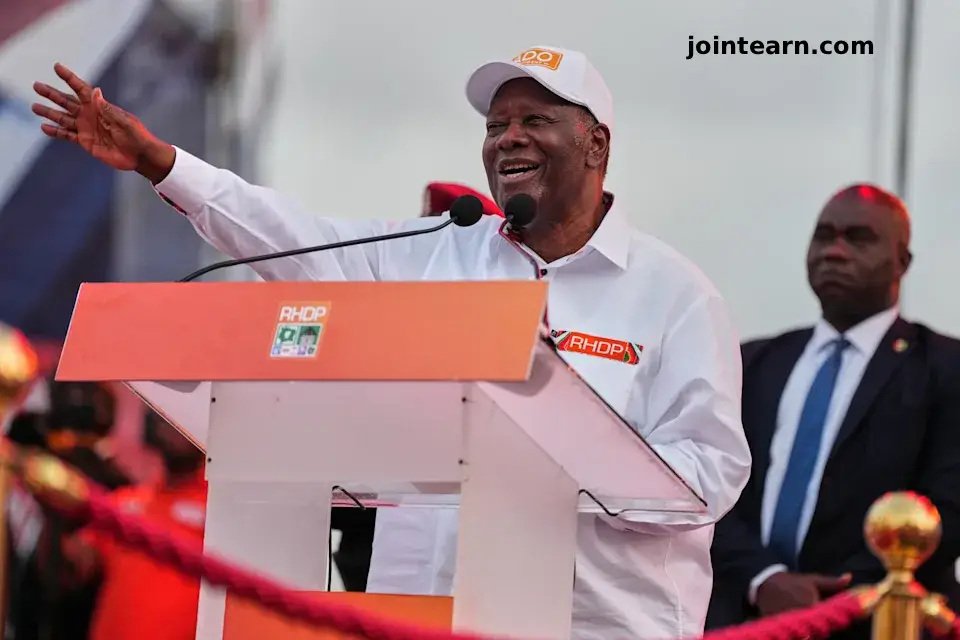
ABIDJAN, Ivory Coast — Polls have officially opened across Ivory Coast as millions of citizens cast their ballots in a high-stakes presidential election that could extend President Alassane Ouattara’s rule into a fourth term, solidifying his position as one of Africa’s longest-serving leaders.
Voting began shortly after 0800 GMT on Saturday, following minor delays, with polling stations set to close at 1800 GMT. Over 8.7 million registered voters are eligible to participate, though turnout has historically hovered just above 50%.
Ouattara Poised for Victory as Opposition Falters
Ouattara, 83, has led the world’s top cocoa-producing nation since 2011, overseeing strong economic growth and significant infrastructure development under his Rally of Houphouëtistes for Democracy and Peace (RHDP) party, which already dominates parliament with 169 of 255 seats.
Despite this track record, the election is marred by controversy. The disqualification of major opposition figures — including former president Laurent Gbagbo and ex–Credit Suisse CEO Tidjane Thiam — has fueled allegations of political repression and sparked sporadic protests nationwide. Analysts and observers predict a comfortable first-round victory for Ouattara due to the fragmented and weakened opposition.
An Aging Leader in a Young Continent
Ouattara’s candidacy highlights a broader trend in African politics — aging leaders maintaining power in nations with overwhelmingly young populations. Alongside Cameroon’s Paul Biya (92), Uganda’s Yoweri Museveni (81), and Equatorial Guinea’s Teodoro Obiang Nguema Mbasogo (83), Ouattara represents a generation of leaders reluctant to relinquish control.
If successful, Ouattara’s fourth term would bring his total time in power to nearly two decades, further consolidating his influence over Ivory Coast’s political and economic institutions.
A Nation Divided but Hopeful
Despite years of economic expansion averaging 6% growth annually, more than 37% of Ivorians still live in poverty. Rising living costs, youth unemployment, and regional inequality remain pressing issues, especially in rural areas where infrastructure development has lagged.
“Growth has been huge, but we need to continue,” Ouattara told a massive crowd during his final rally at Republic Square in Abidjan on Thursday. Thousands of supporters, dressed in RHDP colors, danced and waved flags as the president promised continuity and prosperity.
His opponents — including former first lady Simone Gbagbo, former commerce minister Jean-Louis Billon, civil engineer Ahoua Don Mello, and moderate candidate Henriette Lagou — held smaller rallies across the country. Each vowed to bring change through job creation and agricultural reform, though analysts say none pose a serious challenge to the incumbent.
Protests, Security Clampdown, and International Silence
The campaign period has been marked by tension and sporadic violence. Protests erupted following the exclusion of Gbagbo and Thiam, leading to hundreds of arrests and dozens of imprisonments. The government subsequently banned unauthorized gatherings and deployed over 40,000 security personnel nationwide to prevent unrest, particularly in opposition strongholds in the south and west.
Ouattara has dismissed allegations of an opposition crackdown, maintaining that Ivory Coast’s democracy remains intact.
“The election is free, fair, and transparent,” said government spokesperson Amadou Coulibaly on Friday. “Ivorians know the stability and progress our president has delivered.”
International observers, including the African Union (AU) and ECOWAS, are monitoring the vote. Yet analysts note that France, the nation’s former colonial power, has shown muted interest amid shifting global priorities.
“The geopolitical context is favorable to Ouattara,” said Séverin Yao Kouamé, a political science professor at the University of Bouaké. “Western partners are distracted, giving him room to operate without much external pressure.”
What’s at Stake
For many Ivorians, the election is a referendum on two decades of relative peace and growth versus concerns about democratic backsliding and political exclusion.
“I want peace first,” said Mariam Traoré, a 32-year-old voter in Abobo. “But I also want jobs for young people. That’s what will decide who I vote for.”
Vote counting will begin immediately after polls close, with provisional results expected within 48 hours. Observers warn that low turnout or contested outcomes could rekindle memories of the 2010–2011 post-election crisis, which left over 3,000 people dead.
As Ivorians line up under the scorching sun, the world watches to see whether this election cements Ouattara’s dominance or reawakens the country’s divisions.


Leave a Reply